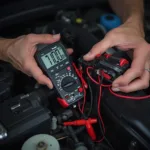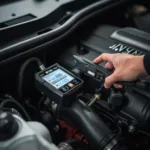One of the most frustrating experiences a car owner can have is seeing that dreaded check engine light illuminate on their dashboard. While it could signal a minor issue, it often indicates something more serious requiring immediate attention. The first step to addressing the problem is identifying the underlying cause, which is where your OBD2 scanner and the code it provides come into play. One such code that often pops up is the P0456 code. This article aims to demystify the P0456 OBD2 code, explaining its meaning, common causes, diagnostic approaches, and potential solutions.
What Does the P0456 OBD2 Code Mean?
The P0456 code specifically points to a “very small leak detected in the evaporative emission (EVAP) system.” In simpler terms, it means your vehicle’s computer has detected a minor leak in the system responsible for capturing and purging fuel vapors.
The EVAP system plays a crucial role in reducing your vehicle’s emissions. It prevents fuel vapors from escaping into the atmosphere by capturing them in a charcoal canister. These vapors are later purged back into the engine for combustion.
Common Causes of OBD2 Code P0456
While a “very small leak” might sound insignificant, it’s essential not to ignore this code. Even minor leaks can worsen over time, potentially leading to:
- Increased fuel consumption: A leaking EVAP system can disrupt the optimal air-fuel mixture in your engine, causing it to burn more fuel.
- Environmental damage: Fuel vapors released into the atmosphere contribute to air pollution and harm the environment.
- Failed emissions tests: A leaking EVAP system can cause your vehicle to fail emissions tests in regions with strict regulations.
The P0456 code can stem from various culprits, and pinpointing the exact source often requires a systematic diagnostic approach. Here are some of the most prevalent causes:
- Loose or Damaged Gas Cap: A loose, cracked, or damaged gas cap is the most frequent cause of the P0456 code. It’s the simplest and least expensive issue to fix.
- Faulty Purge Solenoid: The purge solenoid controls the flow of fuel vapors from the charcoal canister to the engine. A malfunctioning solenoid can lead to leaks.
- Cracked or Disconnected EVAP Lines: The EVAP system comprises hoses and lines that can crack, deteriorate, or become disconnected over time, causing leaks.
- Damaged Charcoal Canister: The charcoal canister itself can become damaged or saturated, affecting its ability to store fuel vapors effectively.
Diagnosing the P0456 Code
Diagnosing the P0456 code often involves a multi-step process:
- Visual Inspection: Begin by visually inspecting the gas cap for any visible cracks, damage, or looseness. Also, examine the EVAP lines under the hood and near the fuel tank for any signs of damage or disconnection.
- Check for Stored Codes: Connect your OBD2 scanner and check for any other stored codes alongside the P0456. These additional codes can provide valuable clues about the root cause.
- Smoke Test: A smoke test is a highly effective method for pinpointing EVAP leaks. This test involves injecting harmless smoke into the EVAP system, making it easy to spot leaks visually.
Fixing the P0456 Code
Once you’ve identified the source of the P0456 code, you can take the necessary steps to rectify the issue. Here are some possible solutions based on common causes:
- Tighten or Replace the Gas Cap: If the gas cap is loose or damaged, tighten it securely or replace it with a new one.
- Replace the Purge Solenoid: If the purge solenoid is faulty, replace it with a new one. This process typically involves disconnecting the old solenoid and connecting the new one in its place.
- Repair or Replace EVAP Lines: If you discover cracked or disconnected EVAP lines, repair them using specialized tape or replace the damaged sections with new lines.
- Replace the Charcoal Canister: If the charcoal canister is damaged or saturated, it will need replacement.
After addressing the issue, clear the code using your OBD2 scanner and drive your vehicle for a while to see if the code returns. If the problem is resolved, the check engine light should remain off.
Expert Insight
“Many car owners underestimate the importance of a properly functioning EVAP system,” says automotive engineer and OBD2 expert, Dr. Emily Carter. “While it might seem like a minor issue, ignoring a P0456 code can lead to more significant problems and costly repairs down the road.”
FAQs about OBD2 Code P0456
Can I still drive my car with a P0456 code?
While you can technically still drive with a P0456 code, it’s not advisable to ignore it. Addressing the issue promptly can prevent further damage and ensure your vehicle runs efficiently.
How much does it cost to fix a P0456 code?
The cost of fixing a P0456 code can range significantly depending on the underlying cause. A simple gas cap replacement can be inexpensive, while replacing a charcoal canister can be more costly.
Can I fix a P0456 code myself?
Depending on your mechanical skills and the specific cause, you might be able to fix a P0456 code yourself. However, if you’re unsure, it’s always best to consult a qualified mechanic.
Conclusion
The P0456 OBD2 code, while indicating a minor leak in your vehicle’s EVAP system, should not be ignored. By understanding its meaning, potential causes, and diagnostic approaches, you can address the issue promptly and ensure your vehicle operates at peak performance while minimizing its environmental impact. Regular maintenance and using a reliable OBD2 scanner can help prevent and address such issues effectively.
If you’re experiencing a P0456 code or other car troubles, don’t hesitate to contact our team of experts at OBDFree. We’re available 24/7 via WhatsApp at +1(641)206-8880 or email at [email protected] to provide guidance and support.

